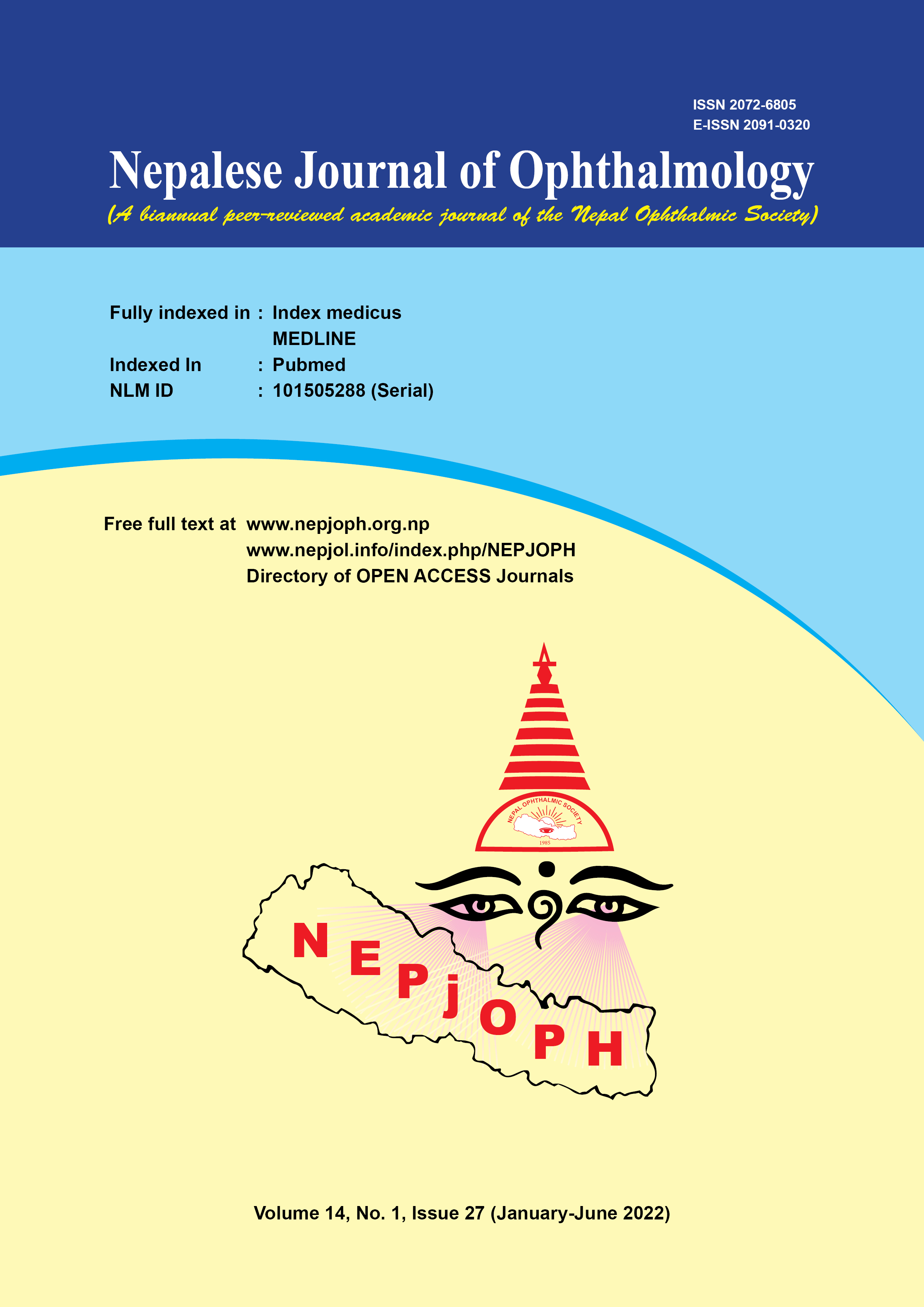Endoscopic Endonasal Dacryocystorhinostomy under Local Anesthesia or Assisted Local Anesthesia
DOI:
https://doi.org/10.3126/nepjoph.v14i1.21971Keywords:
DCR, Endoscopic endonasal DCR, Local anesthesia, Nasolacrimal duct obstructionAbstract
Introduction: Endoscopic Endonasal Dacryocystorhinostomy (EENDCR) is effective, safe and less time consuming procedure and scar free to manage patients with epiphora. Traditionally, EENDCR is performed under general anesthesia. Limited general anesthesia facility in our country has made EENDCR surgery limited to the hospitals with GA facilities. EENDCR surgery under local or assisted local anesthesia could be an alternative solution. The aim of the study was to study the pain tolerability of the patient undergoing EENDCR under local anesthesia (LA) or assisted local anesthesia (ALA). To the best of our knowledge, there is a lack of similar studies in Nepal.
Materials and methods: This was a prospective, nonrandomized, interventional study done at a tertiary eye care center. After sample collection the study was aimed to evaluate the pain tolerability of patients undergoing EENDCR under LA or ALA. The case collection and the surgery were done by a single surgeon from 2018 Jan- 2019 April and followed for 6 to 24 months. All consecutive cases were enrolled in the study. Informed consent was obtained from all the patients. Inclusion criteria included chronic dacryocystitis with NLDO (Nasolacrimal duct obstruction), lacrimal sac mucocele and lacrimal sac pyocele. Previously failed DCR surgery was not included in the study. Total of 100 patients of EENDCR with a tube who completed a minimum 6 months follow up postoperatively were included in the study. Verbal rating scale (VRS) was used to report response to pain during different steps of surgery.
Results: There were 100 patients within the age range of 13-41 years of age. One hundred and six EENDCR were performed on 100 patients. Eighty-seven patients were adult (19-41) years and 13 patients were of pediatrics age group (13-18) years. There were 74 female and 26 male patients. Thirty-seven were RE (right eye), 57 were LE (Left eye) and 6 were BL (bilateral). Duration of illness was less than 6 months in 9 patients and more than 6 months in 91 patients. Ninety-two eyes were operated under LA and fourteen eyes of 11 patients asked for sedation in addition to local anesthesia (ALA). Patients reported pain during the creation of the bony ostium with Keryson’s rounger (24 eyes, VRS 3-4) and while using the drill (19 eyes, VRS 5-6). On pain scoring, there was no pain (0-2) in patients who underwent EENDCR under ALA. Pain scoring in patients who underwent EENDCR under LA showed no pain (0-2) in 51.08%, mild pain (3-4) in 26.08%, and moderate pain (5-6) in 20.65%. Duration of surgery ranged from 15 to 45 minutes. Duration of follow up was 6- 24 months. There was a 96.2% success rate in this study.
Conclusion: EENDCR can be done under LA or ALA depending on the indication and demand of the patient.
Downloads
Downloads
Published
How to Cite
Issue
Section
License
Copyright (c) 2022 Nepalese Journal of Ophthalmology

This work is licensed under a Creative Commons Attribution-NonCommercial-NoDerivatives 4.0 International License.
This license enables reusers to copy and distribute the material in any medium or format in unadapted form only, for noncommercial purposes only, and only so long as attribution is given to the creator.




